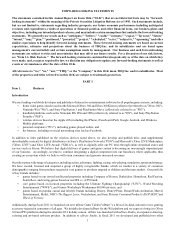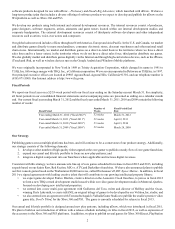THQ 2011 Annual Report Download - page 18
Download and view the complete annual report
Please find page 18 of the 2011 THQ annual report below. You can navigate through the pages in the report by either clicking on the pages listed below, or by using the keyword search tool below to find specific information within the annual report.come via online markets or digital distribution such as massively multi-player games (both subscription and free-to-play), casual
micro-transaction based games, paid downloadable content and digital downloads of games. Accordingly, we plan to continue
integrating a digital component into all of our key franchises. However, if we fail to anticipate and adapt to these and other
technological changes, our market share and our operating results may suffer. Our future success in providing online games,
wireless games and other content will depend upon our ability to adapt to rapidly-changing technologies, develop applications to
accommodate evolving industry standards, and improve the performance and reliability of our applications.
Connectivity issues related to digital sales and online gameplay could impact our ability to sell and provide online services for
our games, and could impact our profitability.
We rely upon various third-party providers, such as PlayStation Network, Microsoft's Xbox Live, Valve's Steam platform, and
Facebook, to provide connectivity from the consumer to our digital products and our online services. Connectivity issues could
prevent customers from accessing this content and our ability to successfully market and sell our products could be adversely
impacted. In addition, we could experience similar issues related to services we host on our internal servers. Such issues also
could impact our ability to provide online services, and could impact our business.
Our inability to acquire or create new intellectual property that has a high level of consumer recognition or acceptance could
negatively impact our net sales and profitability.
We generate a portion of our net sales from wholly-owned intellectual property. The success of our internal brands
depends upon our ability to create original ideas that appeal to the core gamer. Titles based on wholly-owned intellectual property
can be expensive to develop and market since they do not have a built-in consumer base or licensor support. Our inability to create
new products that find consumer acceptance could negatively impact our net sales and profitability.
Since a significant portion of our net sales is based upon licensed properties, failure to renew such licenses, or renewals of
such licenses on less advantageous terms, could cause our net sales and/or our profitability to decline.
Games we develop based upon licensed brands make up a substantial portion of our sales each year. Sales of our games
based upon our two top-selling licensed brands, UFC and WWE, excluding the impact of changes in deferred net revenue, comprised
approximately 32% of our net sales in fiscal 2011. In fiscal 2010, sales of our games based upon our two top-selling licensed
brands, UFC and WWE, excluding the impact of changes in deferred net revenue, comprised 35% of our net sales. A limited
number of licensed brands may continue to produce a disproportionately large amount of our sales. Due to the importance to us
of a limited number of brands and the intense competition from other video game publishers to publish games based upon these
licensed brands, we may not be able to renew our current licenses or may have to renew a brand license on less advantageous
terms, which could significantly lower our net sales and/or our profitability. During fiscal 2011, we entered into a multi-year
extension of our long-term agreement with Games Workshop to publish games based on the Warhammer 40,000 brand which
expires on December 31, 2020. Our licenses with UFC and WWE expire on December 31, 2018. There can be no assurance that
we will be able to extend such licenses and if we are not able to extend them, our net sales and/or our profitability may decline
significantly.
A decrease in the popularity of our licensed brands or video games based on those brands could materially impact our net sales
and financial position.
As previously mentioned, a significant portion of our net sales are derived from products based on popular licensed
properties. A decrease in the popularity of the underlying property of our licenses could negatively impact our ability to sell games
based on such licenses and could lead to lower net sales, profitability, and/or an impairment of our licenses, which would negatively
impact our profitability.
High development costs for games which do not perform as anticipated and failure of platforms to achieve significant market
penetration could decrease our profitability and result in potential impairments of capitalized software development costs.
Video games played on consoles and certain online games (e.g., multi-player online games) are expensive to develop.
If the high development costs are not offset by high net sales and other cost efficiencies, our operating margins and profitability
will be negatively impacted. Additionally, if our games do not achieve significant market penetration, we may not be able to
recover our development costs, which could result in the impairment of capitalized software costs, which would negatively impact
our profitability.
9
























